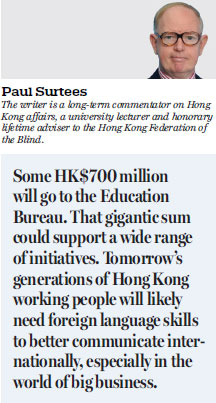New budget a step in the right direction but more can be done
Updated: 2017-02-24 07:14
By Paul Surtees(HK Edition)
|
|||||||||
The budget announced on Wednesday by newly appointed Financial Secretary Paul Chan Mo-po ticked quite a few of the right boxes. Several aspects of these financial plans are very welcome, although many observers might opine that on some vitally important matters, too little is being offered. While half a loaf is better than none, Hong Kong could readily afford to go the whole hog by being more generous about certain aspects of longer-term government expenditure where the need is patently obvious. The estimated surplus for the 2016-17 tax year was only HK$11 billion; whereas we are pleasantly surprised by a whopping surplus of HK$92 billion. This means that our reserves will balloon to a mind-boggling HK$952 billion by the end of March, 2018. Our new financial secretary comes from an accounting background, and accountants are generally very good at balancing the books. They also tend to be on the side of caution. This budget, too, is financially rather conservative and, while increasing expenditure in some much-needed areas, unfortunately leaves others underfunded.

From the additional HK$1 billion allocated to youth development - surely a very worthy cause as it affects our long-term future - some HK$700 million will go to the Education Bureau. That gigantic sum could support a wide range of initiatives. Tomorrow's generations of Hong Kong working people will likely need foreign language skills to better communicate internationally, especially in the world of big business. This handout to the Education Bureau could be dipped into, to fund having two or three native English teachers placed in every school, rather than the thinly stretched current allocation of just one in some schools. Similarly, a couple of dedicated native speakers and teachers of Mandarin (Putonghua) could usefully be deployed to each school.
By the 2018-19 academic year, the study subsidy scheme will grow from 1,000 to 3,000 students being supported. That certainly represents 3,000 steps in the right direction, to be welcomed with a view for more.
Some HK$30 billion is going toward developing elderly services and for rehabilitation services for the disabled. Such increased expenditure is totally justified. Vital issues which require still greater support - and thereby much greater expenditure of government-held funds - include our growing wealth gap, aging population, and addressing that unfortunate combination of both, the growing number of elderly people who are poor.
Apparently, some hecklers in the Legislative Council shouted out for the building of more public hospitals. Our hospitals, efficient though most of them are, are already struggling to provide timely medical services to the growing army of poor old people in Hong Kong. More do need to be built - and soon - and more doctors and nurses trained to staff them. And before this happens, we need to hire foreign medical personnel to make up for the current staff shortage.
A sweetener of an additional month's allowances is a welcome windfall to those receiving social security. While that, again, is helpful, increasing these paltry levels of allowances every month would provide much longer-term financial relief to those so badly need it. It may be asked, what is the point of sitting on these colossal financial reserves (larger than those held by many developed countries, and far greater than can reasonably be needed here), when they could be put to immediate good use by increasing the standard of living of our more vulnerable and elderly groups?
The perceived shortage of public housing in this teeming city is also addressed in this budget. Land will be made available to build more homes, itself bringing in more income from land sales. Some 94,500 new public housing units are expected to be built over the next four years. Concurrently, the Housing Authority could also do much more to alleviate the current long wait by ejecting from their very cheap flats the many inhabitants who are now earning well above the income limit for those entitled to subsidized public housing.
A more costly but much-needed step would be to allocate a fair part of these reserves to the setting-up of a universal pension scheme, a scheme which would also support those people who are already too old to work.
(HK Edition 02/24/2017 page2)